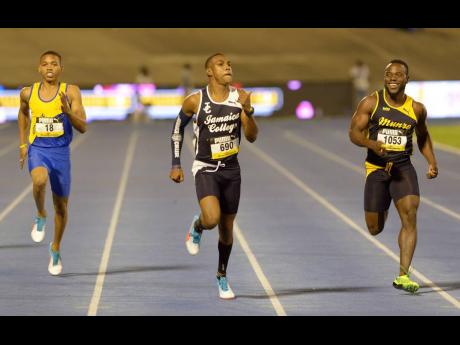Visa worry for Ja student athletes in US
Imagine giving everything you have to your craft throughout your high school track and field career and landing an athletic scholarship for your university. Then comes the COVID-19 pandemic, forcing social distancing in every aspect of society, including schools. In response, universities have decided to offer some programmes fully through online classes. Yours is included.
The problem with this is that United States of America (USA) President Donald Trump’s administration has ordered that students whose classes were moving entirely online for the new school year would be stripped of their visas and required to leave the country.
Many Jamaican student athletes in the USA found themselves worrying about their status and having to return to the island, but one says everything will be fine in the end.
Ksenia Maiorova, immigration lawyer and managing partner at Maiorova Law Group in Orlando, Florida, says there could be serious implications for foreign athletes looking to stay in the National Collegiate Athletic Association (NCAA) to compete for another season before becoming a professional athlete, because of the pandemic’s disruption.
“Those are the students who would be on full scholarships getting housing, getting their food covered, and suddenly they’re unable to maintain those scholarships but they don’t have a pro contract,” she said. “We could be looking at those students losing the ability to financially maintain themselves while in the United States to cover their basic living expenses. They were relying on those scholarships, and if they’re not able to maintain their immigration status, those scholarships would obviously go away.”
Sprinter Delano Dunkley, formerly of Jamaica College, now at the University of Georgia majoring in Communication Studies, says his school has weighed up the implications and is taking measures against its athletes losing their visas.
“I already spoke to my coach and everything is under control,” he told The Gleaner. “It’s not just Georgia, but every university that has a student athlete is fighting against what Trump has in his intentions because it is just totally wrong.
“If this rule, or whatever it is, is passed, I think universities will be doing their best to protect the students to have at least one [course] in class and the rest online.”
Former Texas A&M University sprint coach Vince Anderson agrees with Dunkley, and said he is not immediately concerned about the possible implications.
“A lot of logistics would be involved,” he said. “Second, while that was a federal threat, Massachusetts Institute of Technology and Harvard [University] have filed suit to stall that. Who knows how that’s gonna go?
“Very often, when items are being tried in court, sometimes they suspend any actions until a decision has been made on that. That’s gonna bide time for all these athletes.”
MAIOROVA AGREES WITH ANDERSON.
“They are likely to be successful [on an injunction] because the administration did not accept the standard rule-making process before implementing this change,” she said. “So it is likely that at minimum, a temporary injunction will be issued by the court while it considers the case on merits.”
Anderson says every university and conference, depending on their budget and class, will react to this directive differently. He says that there will also be different responses for each state in America.
“Maybe some universities have the ability to create a special in-person class for their international students (like Dunkley said is likely to happen at his school) as a means of protection. Who knows what can and cannot be done? I don’t think it’s a serious threat yet, but I’ll believe it when they start sending people home.”
Anderson said that he can’t see that happening as there are too many international students in the USA to remove at once. The NCAA has over 20,000 international students registered as athletes. This is just a fraction of the international student body, as a whole, currently in the US with a student visa.
Although some universities are making provisions for their students, some students of those smaller universities without the finances to host in-person classes during the pandemic are still left in a vulnerable position. Maiorova is concerned about the timing of a possible ruling and how it may affect these student athletes.
She says the decision on the merits could take an extended period of time. This means that one of the possible consequences of this is that a ruling could be made in the middle of an academic semester or year.
She describes such a possible outcome for students as chaotic.

